Previously on Drokk!: There’s no escaping it; we’re in the mid-1990s now, which is almost certainly the darkest period for Judge Dredd as a property, as the strip in both 2000 AD and the Judge Dredd Megazine feels directionless and at the mercy of an ever-changing creative team. Hopefully the fact that character co-creator John Wagner is returning to prominence can only mean good things, right…?
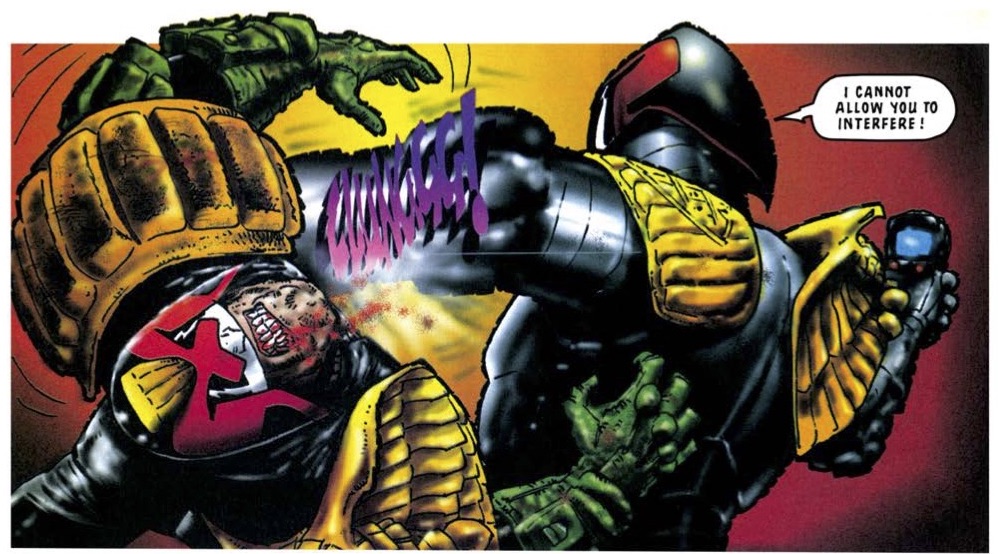
0:00:00-0:05:17: The cold open makes it somewhat clear: Judge Dredd: The Complete Case Files Vol. 21 is a book that is somewhat perplexing, and not entirely that good. We’re still featuring material from 1993 and 1994 at this point, including a crossover between 2000 AD and the Magazine, but as it turns out, even having John Wagner write these things is no guarantee of quality…

0:05-18-0:10:22: We start off by talking about how slight and underwhelming the first third of this book is — collecting 2000 AD strips, predominantly written by Wagner, there’s a retro feel to proceedings, in some cases literally, with two stories that deal with time travel between the future of Mega-City One and the then-present day — a fact that leads us to talk about another time travel story in the collection…
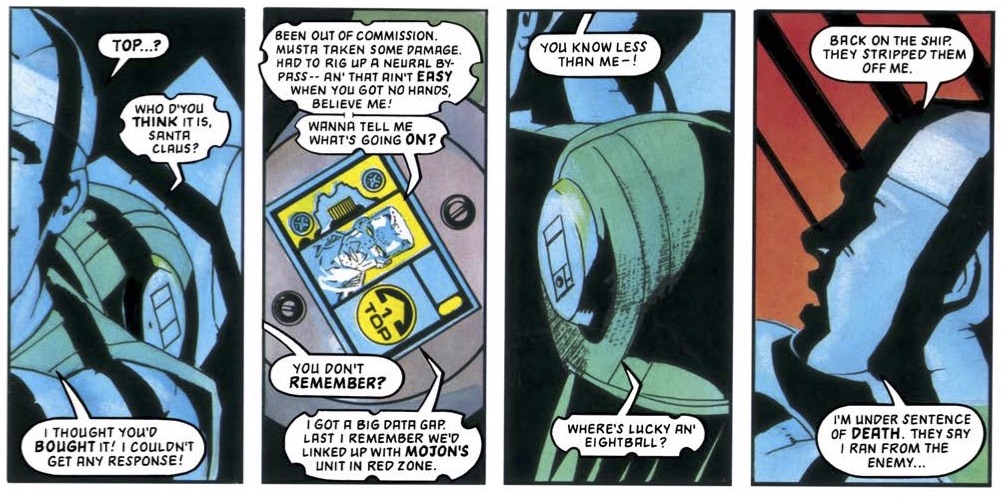
0:10:23-0:27:53: In theory, a John Wagner-written crossover between Judge Dredd and Rogue Trooper could and should be a joy to read, with some inherent drama between the ultimate cop and a soldier who rejects authority to get the job done. In reality, “Casualties of War” is… a mess. We talk about the reasons why that is, why it reads like a mediocre issue of Marvel Team-Up, and why John Higgins didn’t help matters at all.
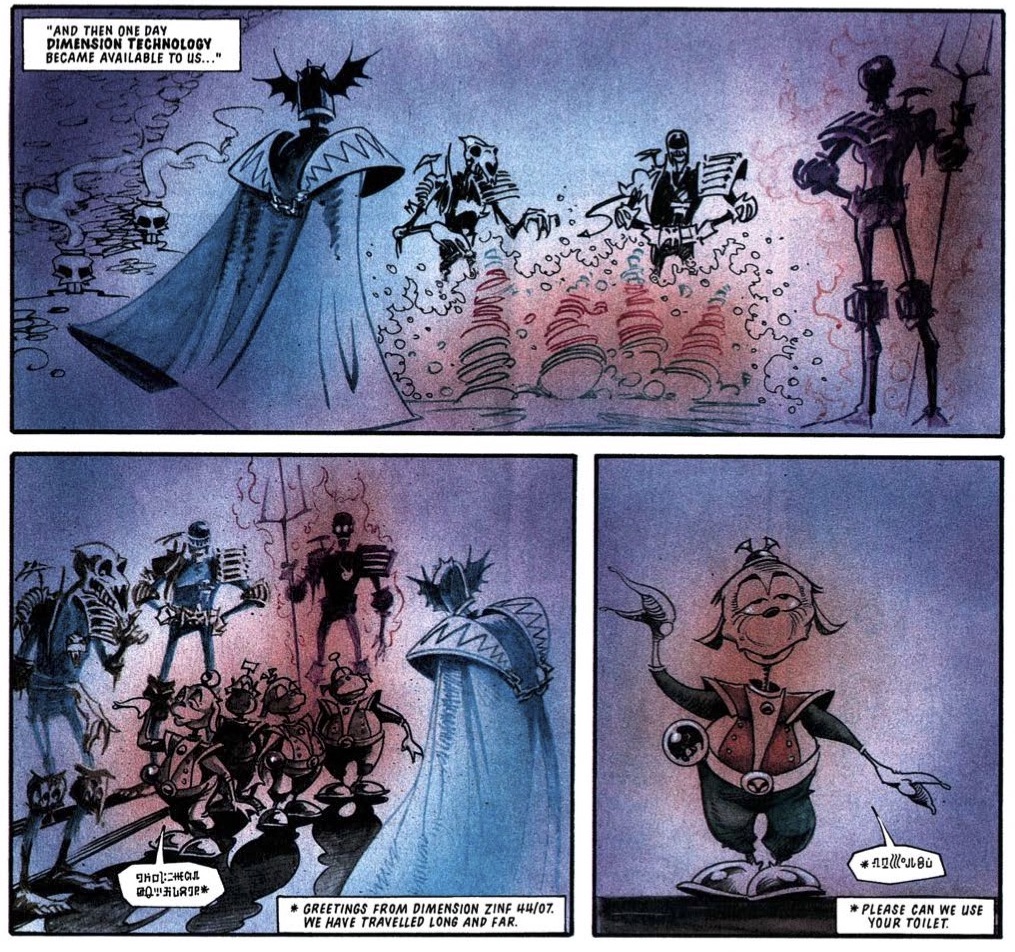
0:27:54-0:37:52: Sadly, “Casualties of War” is just one of a number of Wagner-written letdowns in Case Files 21, and we discuss various potential reasons why that might be… and why other writers aren’t really able to come up with anything better, either. Is there too much of a recognizable formula after 900 issues? Is Wagner trying to write against that formula but failing to come up with a replacement? Come for a discussion about the ways in which Wagner is unfunny in this volume in a way we’ve Neve seen from him, stay for Jeff’s suggestion that the writer is “becoming more Judge Macgruder than Judge Dredd.”
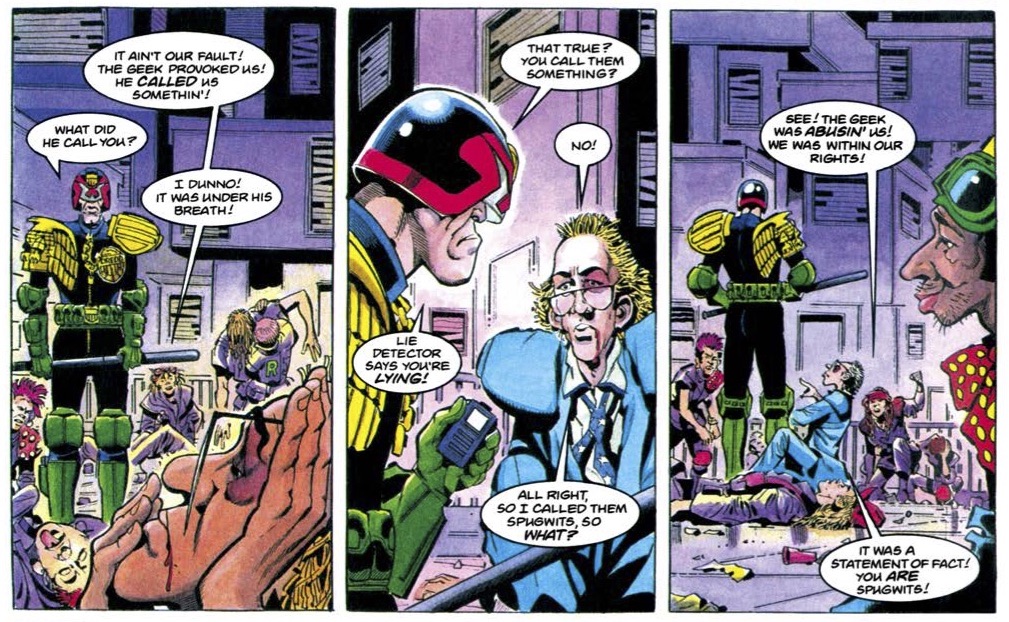
0:37:53-0:45:50: We wrap up discussion of the pre-crossover part of the volume by identifying that boring Judge Dredd is a worse sin than bad Judge Dredd, naming our favorite stories from the first section of the book (Mine is “A Guide to Mega-Speak,” Jeff’s either “Part Exchange” or “Casualties of War”), and very briefly wondering if boring-but-competent is the ideal format for a corporate character with a long publication history.
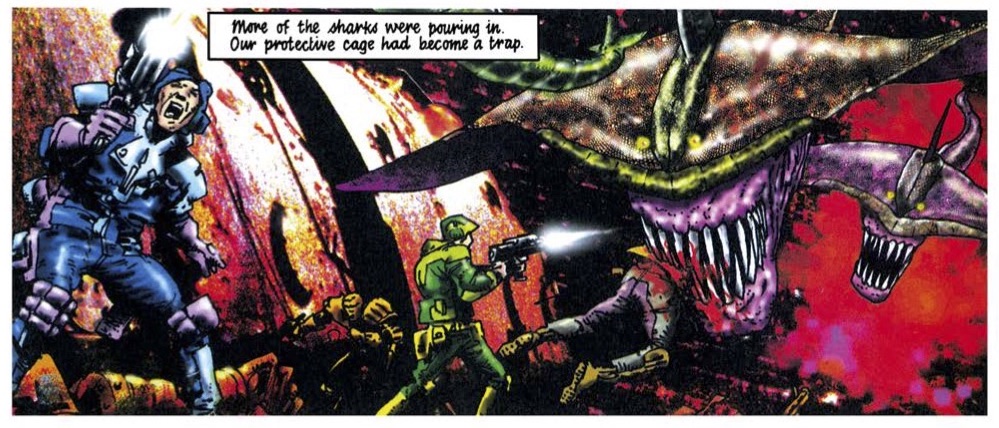
0:45:51-1:43:21: And then we get to “Wilderlands,” the crossover that takes up two-thirds of the volume, disappoints us both pretty dramatically, and has different pronunciations from both Jeff and I. (Jeff emphasizes the “wild,” which I kind of love.) We talk about a lot here — this section of the podcast is almost an hour long! — but here are just some of the topics: Is Dredd a coward as written here? How great is this final evolution of Macgruder and Dredd’s relationship, and the standoff that consumes it? How much of a mistake was it to sideline Macgruder for almost the entirety of the crossover? (A lot.) What the hell was going on that Wagner’s sense of the unexpected was so entirely lost by the time “Wilderlands” nears its conclusion? (“It’s as if he takes the lamest, laziest way out” for every plot thread, as Jeff puts it.) The multiple better resolutions we managed to come up with. Jeff calling the crossover “the Bataan Death March version of Gilligan’s Island,” which genuinely sounds more fun than the crossover itself. An incredible Lester metaphor in which Judge Macgruder is a metaphor for civilization ruining the frontier. A seeming continuity glitch that just confuses us pretty badly. Is Judge Macgruder the new Chopper? And so much more. No, really, there’s a lot… and all of it because we were really, very disappointed in what we read.
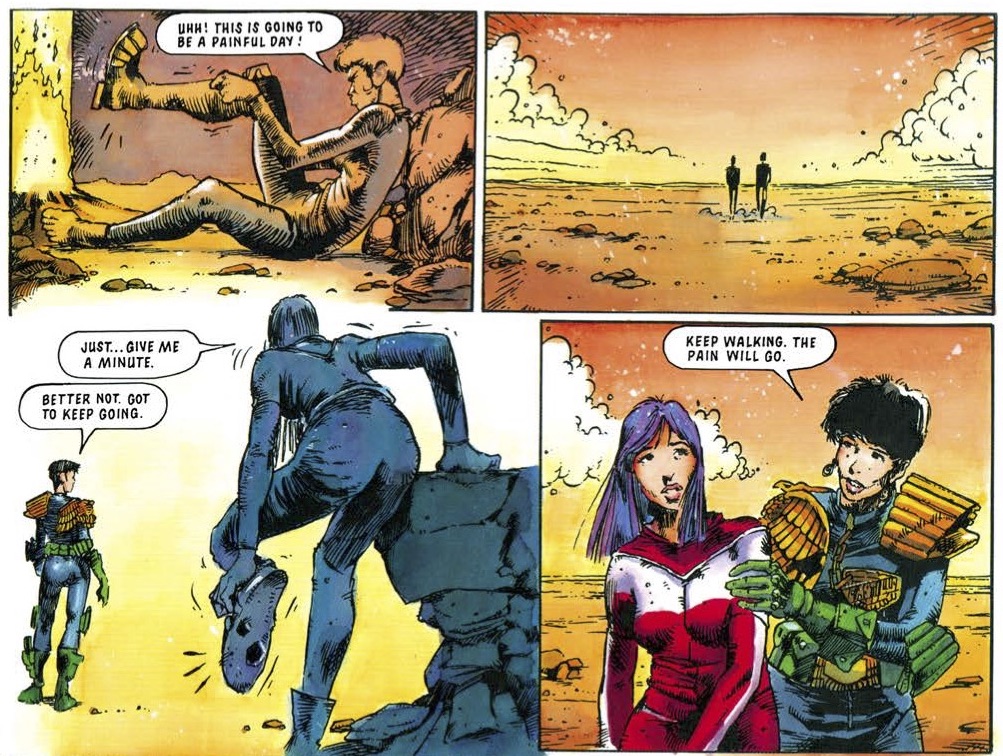
1:43:22-1:50:37: Jeff wonders if one of the reasons for our disappointment with “Wilderlands” is that we’re missing a counter narrative at play, and then tries to find one. He’s not entirely successful, but as we talk about the treatment of Judge Castillo, the phrase “Merchant Ivory” gets mentioned two times more than I ever would have expected on Drokk!, and we struggle with her place in the wider narrative of the entire book.
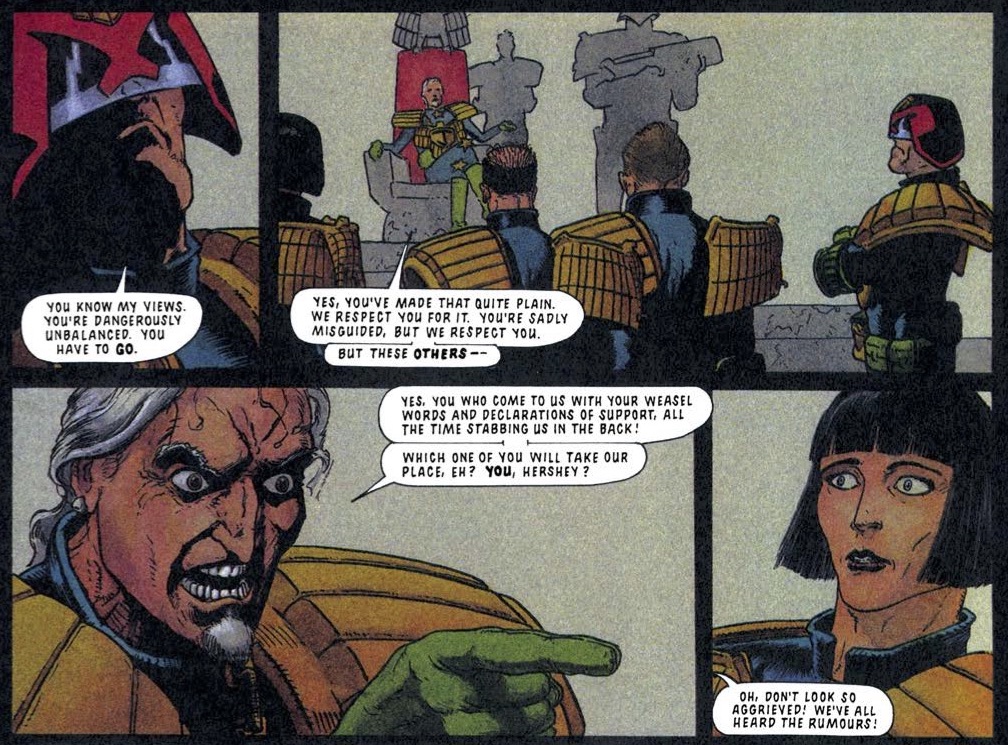
1:50:38-1:59:22: So, after almost two hours of complaining about the many failures of Case Files Vol. 21, is it Drokk or Dross? Jeff goes contrarian by saying Drokk, whereas I stick with my guns and go the other way. We both agree that there’s some great stuff in here and some very not great stuff, but beyond that, I think you’re hearing a glass half full/half empty divide forming right in front of your very ears.
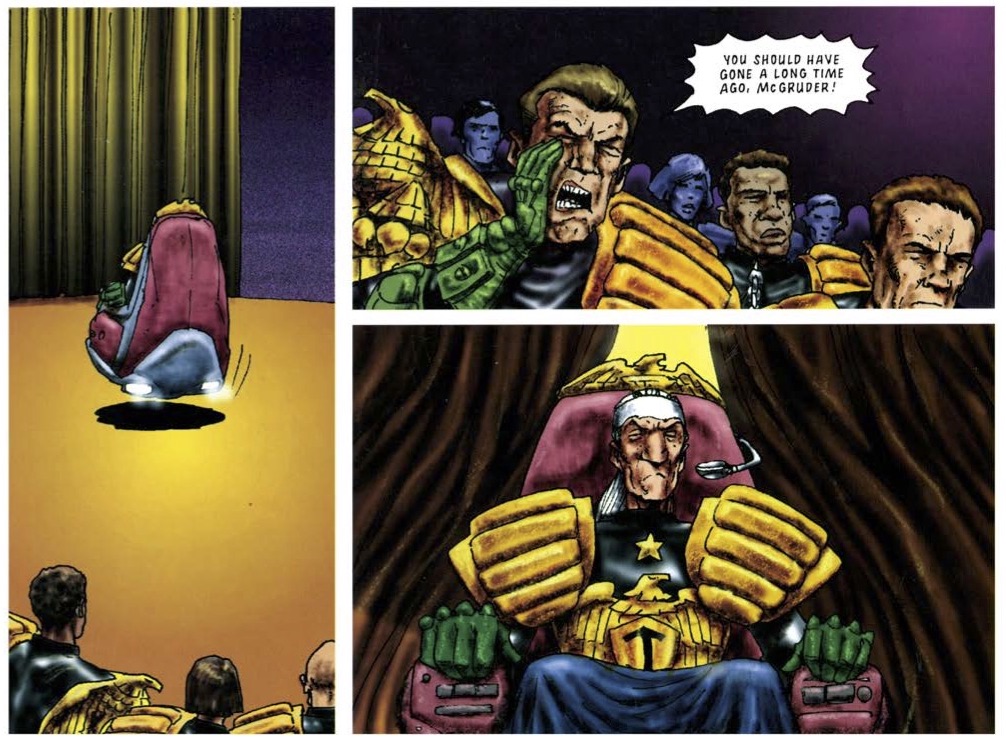
1:59:23-end: We wrap things up very quickly by talking about what’s to come — more Grant Morrison and Mark Millar co-written “delights” — and mentioning, as ever, the Twitter, Instagram, and Tumblrs as well as the Patreon that makes this all possible. There’s more John Wagner ahead, as well, so let’s hope things improve before a month from now…! As ever, thanks for reading and listening.


And for those looking for the direct link… http://theworkingdraft.com/media/Drokk/DrokkEp24.mp3
I don’t see Dredd as a coward in these stories, but can see that depends on how you define ‘coward’. I’d suppose you have to be motivated by fear of the consequences for yourself for the term to be appropriate. I think he’s guilty and submits to judgement because he’s already judged himself. Honestly, I’m more surprised he didn’t turn himself in.
I like McGruder as a Nixonian figure, but Wagner lampshades that the trip to Hestia makes no sense when she makes her speech about Dredd not understanding economics. If she was really wanting to fill an order book why was a tiny colony with a low crime rate the place to start? The shipping costs alone would be eye-watering.
Lesbian subtext? If I had a time machine, I’d travel back to ask you both how that wonderfully awkward hug does or doesn’t fit into this ship. I’m sure I’d enjoy that.
I was appalled that McGruder pulled several thousand senior judges off their duties for a five minute presentation. This plot thread has been about a shortage of judges. I don’t like it when management interrupt my work for pointless meetings and lives are unlikely to be lost. On the other hand, if he’s not the next Chief Judge, I now want to see Dredd on a team building exercise and having a performance review. ‘What are your targets?’ Writes itself, doesn’t it.
Finally, what is McGruder drinking? I found myself thinking ‘synthahol’ but I’m not sure I’m not thinking of some other future. Whatever, it functions as alcohol and as such it’s hard to think of the reason it’s legal in Mega-City One. ‘I’d like to sell a product that disinhibits people, impairs their judgement and poisons them.’ McGruder should have got that sales genius.
I didn’t realize that Ezquerra started using computer program with his art so early. The colouring in pretty much all of his stuff I’ve read from the 2000s has been…well “terrible” is too far, but I can’t say I enjoy it.
However, in this volume I’d still take it over the art in Conspiracy of Silence, in which I missed that someone had passed Dredd an address.
The weirdness/continuity errors of part 13 I think make the ending not land as well. Like, we’re told the robot used Dredd’s voice, but I don’t think we ever see it.
I think that the story would have benefitted from fleshing out one of the other desk jockeys and having them save the day instead of the unconscious McGruder. Then you could have had whoever was in charge of the law on Hestia die and Judge Castillo could stay behind and take over and boom! Instant spin-off
And to David’s comment about the economics of the trip not making sense, I thought that McGruder was just using the entire thing as an excuse to spend more time with Dredd and not send him to Titan immediately.
I admit to enjoying this volume at first, but it doesn’t hold up to a second read or even casual scrutiny. Stil, I’m a sucker for Wagner’s Dredd, so even if the stories and plotting were lackluster, at least his Dredd was on model. I thought we were in for a bad turn after the first story. While having all the trappings of classic Dredd tale, the cartooning was so atrocious I couldn’t even figure out what was going on! When Hershey says she needs to visit the med bay fo the scalding burns from the tea, I looked back to see where, and there was no case of it ever happening. All the action that didn’t happen was dictated in panel far from where it was supposed to happen. It was an ill omen.
I rather enjoyed Wagner’s time travel story. It was that typical comedy of errors tale that have been a staple of 2000 A.D. I loved how the 20th century scientists tried to appeal to Dredd with arguments of due process, but they fell on deaf, fascist ears.
Wilderlands. What can be said that hosts didn’t say?
-Reading this reminded me of an early episode of Drokk when Jeff and Graeme discussed Dredd visiting the moon colony (I believe). And Graeme noted how the creators didn’t have the confidence yet to explore Mega-City One, so right away they’re sending Dredd to the Cursed Earth or off in space. To me, that’s what this felt like. Aside from the contrivance of making a pitstop on the way to Titan, this could have taken place on Earth, either the Cursed Earth or MC1 itself. They could have fallen into the sewers of old city if you wanted to separate McGrudder and Dredd from other judges. I dunno… It was contrivance that went nowhere, as our hosts stated, and I could see were places where setting on Hestia could have added so much, but those chances were ignored.
-Ezquiera’s art… Took me awhile to cotton to it at the beginning of the run. But this Photoshopping? I’m with Jeff in that it did remind me in some inchoate fashion of Kirby’s collages. I was fine with those backgrounds. BUt the coloring just punched my irises the whole time. The black coloration of Dredd’s uniform looked like a disco oil slick on some asphalt.
-Finally, why did the robot judge turn traitor? Will that ever be explained? My feeling was that it was the aliens and their mysterious powers that did it. You can see Wagner hinting that so much is unknown about them but they seem to be able to survive the harshness of the planet effortlessly. The 4th generation girl can even “hear” the messages they leave in the stones. I totally read it as the aliens having caused the robot to malfunction, which is why they could find no problem with the programming. Either Wagner’s failings with the narrative failed to elucidate enough about the aliens to connect everything together, or Wagner just up and abandoned the thread in the interests of just wrapping up the story.
-And Graeme is totally right. Castillo’s story “arc” at the end is completely unearned, even though there were great opportunities to bread crumb it throughout.
-Again, why the contrivance of another planet in the solar system? Does this planet ever show up again, or does it get memory holed?
Finally, almost time for the second Batman-Judge Dredd crossover, no? (*hint, hint*)
“Again, why the contrivance of another planet in the solar system? Does this planet ever show up again, or does it get memory holed?”
I can’t find any other reference to it, which seems kind of weird thinking about it.
Just tried posting a comment which I had composed offline, and there was a server error. So here is a somewhat horter version of some of it to see if typing it directly into the box works.
OK,OK, our hosts are right in an awful lot of what they say about Wilderlands. The pacing problems are very, very obvious, especially when the rescue chapter is completely not there at all, something that does rather suggest that this story got cut short.
And yet, I *like* Wilderlands, damn it! I think it works, at least sort of, if you think of it as a restatement of Dredd as a character and Judge Dredd as a strip, after some time, at this point, of people other than Wagner writing Dredd in 2000 AD and it really not working all that well. Its old-school nature supports that, as does the presence of the ongoing robot story, which in-story is about whether Dredd can be replaced.
Castillo is particularly important. Apart from Anderson, this is the closest look at a judge who isn’t Dredd that we’ve had, and I think it matters that Castillo is presented as being so *normal*. She’s someone through whose eyes we can see Dredd. (Although, my God, John Wagner, that bit where she thinks about Dredd’s attractiveness is a horribly creepy thing for a man in his mid-fifties to write.)
Wagner’s restatement ends up leaning on the more right-wing sympathetic part of his Dredd stories. This is a story about how, if you strip Dredd of all his external sources of authority (the bit where he tells Castillo off for respecting him and is utterly oblivious to how self-contradictory he’s being is one of the funniest Wagner jokes ever), he’s still Dredd, and still naturally takes charge, because you need a Dredd in an emergency. This is basically a cross between a disaster movie and a Western, and both genres are often about shrinking down society at large to a smaller social world and then putting that under pressure.
In this case, it replicates in miniature the original idea of Judge Dredd, of an overcrowded future in permanent crisis that calls for what is essentially a continual state of emergency.
Which, politically, tends in some very disturbing directions, but it’s always been part of Judge Dredd as a story, and in some ways it makes sense to restate it now as a deck-clearing exercise before pushing the character and the story forwward.
Also, if this is because someone told Wagner, “Look, you have to wrap the McGruder thing up,” three [expletive deleted] cheers for that person! Because it really is past time for her to be pushed forcefully off-stage. The Thatcher-parody aspect of her has become more and more pronounced, at a time when there was less and less point in doing a Thatcher parody at all. Clear those decks in particular, right now!
Voord’s right about Castillo seeming ‘normal’, but isn’t it a problem of the series that increasing numbers of judges seem normal? They are prey to all sorts of human problems such as ego and vanity. Dredd is now so exceptional he should be studied to see why the training worked so well on him.
Also this morning I realised I want to see judges who take their helmets off have ‘helmethead’. Similarly ‘maskhead’ for cowl wearing superheroes.
I don’t know that I’d call it a problem, but it’s definitely a thing.
In some ways, it’s been there from the beginning. Dredd was introduced as Mega-City One’s “top lawman” (there apparently being no lawwomen, as is rather obvious in the Judge Cal story). I think that’s fairly consistently Pat Mills’s take during that period, that other judges are unimpressive in comparison to Dredd, who is the big hero.
Wagner definitely has some of that when he comes in, but (at least after Grant joins him — I’d have to go back and check the exact chronology) he starts to inject the idea that, no, “*judges* are not ordinary men,” and that it’s the Academy that’s special. You start to get characters like Hershey for whom Dredd is a respected senior colleague, but not extraordinary, people who don’t know that Dredd is the central character of the strip. I’ll admit that it’s a version of Dredd’s world that I really like, personally, where Dredd is certainly very good at his job but is ultimately just another working authoritarian-monster stiff.
(Having Dredd be perceived as superspecial and still be someone who basically patrols and deals with individual crimes — apparently he enjoys an extremely high public profile by sheer word of mouth — is one of those things, like cutting off a handful of routes in the Apocalypse War, where it’s obvious that British creators don’t have a gut-level sense of the scale of America, and just how *big* Mega-City One would be. Not that it would be likely in anything more than a fairly small town anywhere. The world in which every citizen instantly recognizes the name “Judge Dredd,” and knows loads about him is not remotely plausible unless Justice Department are doing some kind of very concerted media push about him, all the time.)
In any case, at this point, Wagner has moved past “Dredd is not that different from other judges,” and back to the idea that, yes, Dredd is special. I don’t know whether that can be connected chronologically to the end of the writing partnership with Grant. But it’s suggestive that the Kraken storyline marks a definite change, to a Mega-City One where Dredd is perceived again as a unique and irreplaceable iconic figure who must be there, even if it has to be in ersatz form.
I do think a lot of that reads as Wagner wrestling with the implications of what he had created once that it had become inevitable that Dredd would go on, with or without him, and I think Wilderlands can be read as revisiting that question once it had gone on without him for a bit (and been generally rather crap).
Judge Dredd was after all something that Wagner came up with in the late ‘70s, at a time when there was no expectation that this had much chance of being more than an ephemeral strip in what would probably be an ephemeral comic. And in some ways, it’s a *really* ‘70s concept. I’ve gone back and watched a number of episodes of The Sweeney since our hosts were doing early Dredd, and I wish I’d done so at the time when they were doing it, because you can draw a very obvious line between it and Judge Dredd.
(The politics of The Sweeney are every bit as awful as I had imagined, but I was not prepared for how well-written it was, at the beginning. Some episodes are astonishingly well-done exercises in keeping the viewer gripped by a single plotline.)
Now it’s coming up to twenty years after that, and Judge Dredd is an unshakeable fixture: the strip, like the character, is old and yet apparently immortal. And the thing that was (a) part of the cultural context when it was created, and so easy not to focus on, and (b) not something you’d care about as much when it was a gimmicky idea for a story that was probably not going to exist for very long anyway, that it’s about a brutal authoritarian who’s the hero — that’s a scab that Wagner has been picking at since the democracy stories in the ‘80s.
Why do we like Judge Dredd, the strip? What’s the secret to why this character works so well — and what (very possibly uncomfortable) things does that say about us? I think that’s a lot of what Wagner is doing here, consciously or not, with this back-to-basics story.